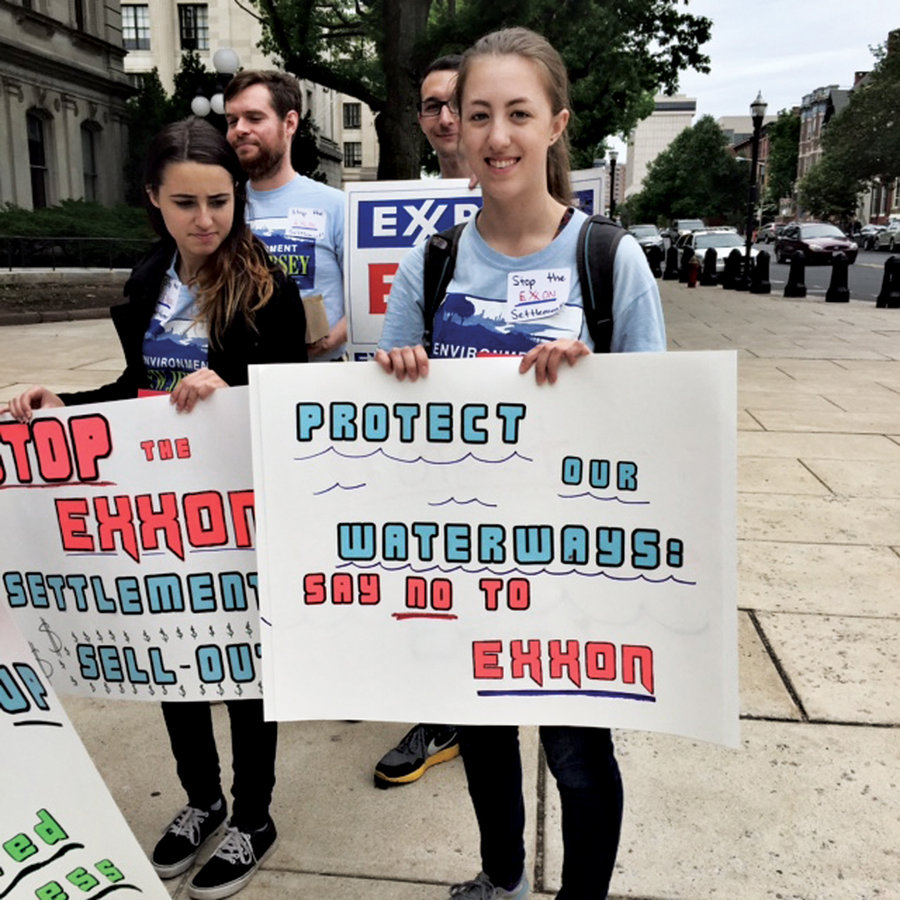A New Jersey court approved a settlement between ExxonMobil and Gov. Chris Christie’s administration over damages due for toxic soil and water contamination in Bayonne, Linden’s Bayway Oil Refinery, and other sites, on Tuesday, Aug. 25.
The state was originally seeking $8.9 billion for the cleanup and remediation of the two major sites. But the state and ExxonMobil negotiated a $225 million settlement which covered the cleanup of the two main sites and at least dozens of others throughout the state.
News of the purported settlement broke after The New York Times published an article in late February.
The agreement gives ExxonMobil more than a 98-percent discount on the state’s original price tag for restoring and replacing the resources.
City, county, and state political leaders and environmental rights groups panned the decision to let the settlement proceed.
Critics said that while the $225 million was the largest negotiated by the state to date, they were doubtful the main sites in Bayonne and Linden would be remediated, and that the ecosystems damaged there were likely gone for good.
Others decried the way the settlement was structured, with only the first $50 million of the $225 million going to environmental causes. The balance of the settlement could be transferred to the state’s general fund for regular budgetary purposes.
Some doubted that cleanups would take place, because they said most of the first $50 million would probably go to lawyers working on the case.
Bayonne Corporation Counsel Jay Coffey said that the decision “isn’t too illuminating” or clear.
“The initial settlement was horrific and I find this decision to be incredibly disappointing,” he said. “We don’t know how this is going to play out. They’re still responsible for the cleanup, but what does that mean?”
Coffey said no study had been done to determine what it would take to clean up the Bayonne site on the east side of the city.
“It’s still a big mystery how much will go to our town,” he said. “Bayonne was built on dirty industry, and I guess we’re going to pay for it for a long time.”
“As we said throughout the whole process, our hope and desire is that Exxon cleans the site so that it can return to active use by industry, the public, and private individuals,” Bayonne Business Administrator Joseph DeMarco said. “That’s always been our main concern, that Exxon honor its responsibility to the citizens and residents of Bayonne by cleaning up the contaminated property. That remains our focus, that it be cleaned up and get back to a healthy state.”
One of Bayonne’s legislators in Trenton agreed.
“It’s unfortunate that the court saw fit to side with Gov. Christie in what I think is a bad deal for the state of New Jersey and the residents of Bayonne,” said 31st District Assemblyman Jason O’Donnell of Bayonne. “I’m hopeful if there’s an appeal to the ruling, the judge can see fit to consider the damages done to our community.”
Environmental groups
The Natural Resources Defense Council (NRDC), along with six other environmental groups, made several efforts to block the settlement.
“This is a slap on the wrist that will do nothing to repair environmental damage the state itself called ‘as obvious as it is staggering and unprecedented in New Jersey,’” said Margaret Brown, an attorney with the NRDC, in a statement.
“This settlement will not even come close to restoring the wetlands, waterways, and natural areas that ExxonMobil destroyed during its operations at multiple sites across New Jersey,” said Deborah Mans, New York/New Jersey Baykeeper executive director.
New Jersey Sierra Club Director Jeff Tittel said the ExxonMobil settlement is more serious than the scandal that has plagued the governor for nearly two years, the dubious lane closures at the George Washington Bridge.
“This is the biggest corporate tax subsidy in state history. In some ways it is a bigger scandal than Bridgegate,” Tittel said. “Bridgegate was about retribution: This settlement is costing the taxpayers billions of dollars.”
Judge’s finding
But Judge Michael J. Hogan of the New Jersey Superior Court found the agreement equitable in his 81-page opinion.
“Although far smaller than the estimated $8.9 billion in damages, Exxon’s payment represents a reasonable compromise given the substantial litigation risks,” Hogan said.
Exxon’s corporate predecessors began operating in Bayonne in 1877 and at Bayway in 1909. Decades of contamination followed at the two sites.
Joseph Passantino may be reached at JoePass@hudsonreporter.com. To comment on this story online visit www.hudsonreporter.com.
